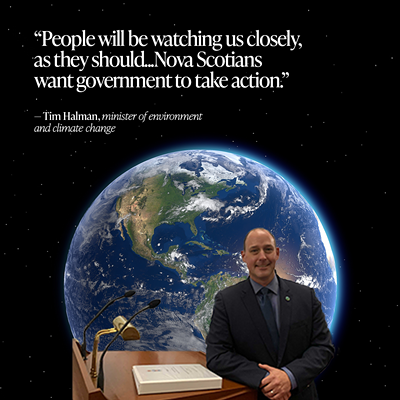
Net zero emissions means for every bad-for-the-environment molecule HRM puts out into the atmosphere, one is being absorbed back into the earth, and it's necessary if Halifax (and the world) wants a chance to slow and halt global warming.
Boiled down, it happens two ways: One, reducing the quantity of greenhouse gas emissions (like Carbon Dioxide) we put out into the world by switching to electric vehicles, more efficient heating of buildings, rooftop solar energy, focusing on less wasteful living, looking at renewable energy and two, increasing the amount of carbon-swallowing things in our world like trees, eelgrass and fertile soil.
But what makes this plan so ground-breaking is it's committed to aggressive timelines (reducing emissions by 75 percent by 2030, while the province is currently only committed to a 53 percent reduction) and its focus on a just transition—ensuring that these changes happen in an equitable (read: not racist) way.
It was January 29, 2019 when Halifax Regional Council declared a climate emergency, and this week it ensured the plan was treated like an emergency, with councillor Sam Austin making a motion to swap city staff's "we'll get to this when we're in a more stable economic standing point thanks to COVID-19" wording for a "we'll get to this with next year's budget regardless of the COVID-19 situation." His amendment to insist on urgency was supported, with only councillor Paul Russel wondering if maybe they should make wiggle room for the following year.
HRM's program manager of energy and environment Shannon Miedema was the driving force behind this plan, and she told councillors that "the time for low hanging fruit has passed us. I think we've done a lot of the easy, we're into the super-super hard multi-stakeholder collaborative type of work."
That means retrofitting current municipal buildings to be net zero, and coming up with a framework for all future construction to be net zero by 2030. New residential houses should be as energy-efficient as possible, and current homes (even those with zero insulation thanks to asbestos in the walls) will need to be souped up. And the best part is, if all goes according to plan, households can hope for almost $4,000 in household energy savings a year down the road.
If executed on time and as promised, the plan will save the municipality $22 billion by 2050, but it will depend on pretty much everyone in the municipality, from top developers to renters, business owners and even the kids (but we're not worried about them), taking this seriously.
Recent Citadel High School graduate and co-founder of School Strike for Climate Halifax Julia Sampson says it's a pretty solid plan—a lot more forward than she expected. But she hopes that there's continued community consultation throughout the 30 years of the plan. "And not only in central communities," says Sampson via text message, "they need to be reaching out to minority and rural communities to ensure this plan is directly influenced by what the people want."
From transit to food to buildings to roads to bike lanes to wind power and solar panels to electric vehicles and hurricane planning to more trees and parkland and actually hiring the staff to do all the work—this plan's got it all. Here's hoping Halifax holds to it.
We live-reported the presentation and discussion at Regional Council about this plan on our Instagram stories. You can watch a looped together version here, or head over to our Instagram highlights to see and engage with the whole thing on the app.















